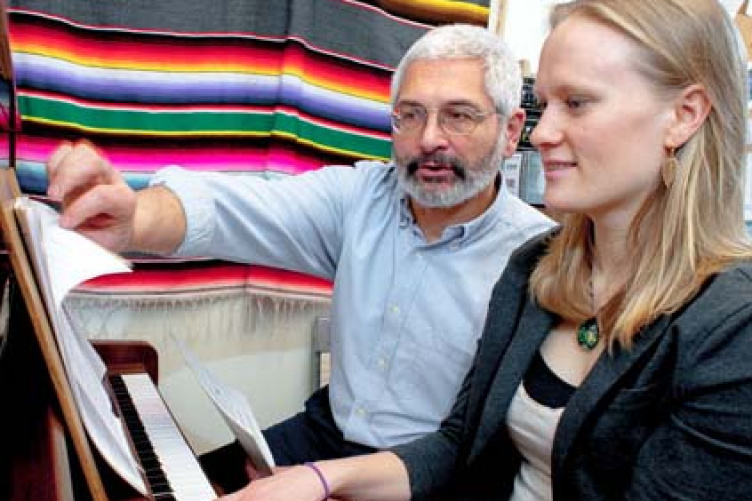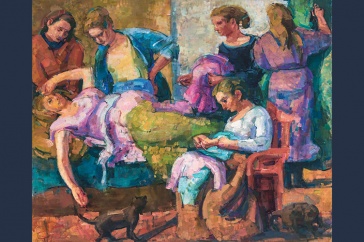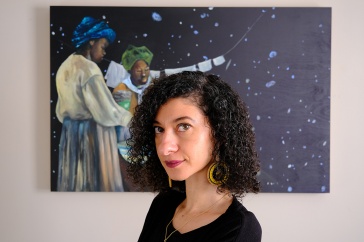
Molly McCahan and Professor Michael Annicchiarico during a theory lesson. Listen to “A Thirsty Fish,” by Molly McCahan, based on the poem of the same name by Rumi, translated by Coleman Barks. Recorded at the 2012 Student Composers Concert, featuring Susannah Thornton, Nick Pothier, and Kurt Villiard. Read poem >>
Music theory major Molly McCahan was only 5 years old when she started taking piano lessons, and she was singing and dancing even earlier. The daughter of music-loving parents, McCahan grew up surrounded by song in her Plymouth, N.H., home. By the time she was considering career paths in high school, her talent and passion for music were deeply rooted. Pursuing it in college seemed a natural choice. Her older sister was already happily studying music at UNH. The younger McCahan decided to follow.
Her Own Voice
For many undergraduates, the college years are a time to discover the breadth of one’s passions. For McCahan that has meant finding her own unique expression as a music composer. It hasn’t been a cakewalk.
“I came into my compositional voice a little late,” says McCahan, “which was worrisome for me because I wondered why I wasn't easily writing music. Why wasn’t it just coming out of me? It seemed like something that should just happen.”
Through discussions with professors and her mom, McCahan realized that finding her voice was a process. And it required her to let go of the pressure to produce and to trust herself.
“For the first two and a half years of college, I had to accrue information and tools: learn and practice theoretical rules, practice how notes work harmonically and how they work in a line. It was like learning a new language,” notes McCahan. “You have to learn the vocabulary before you can step forth and use it.”
She learned, too, to have patience. Then, last spring, she finally started what she calls “serious writing.”
What ended up coming out of McCahan was settings of poems for voice and various combinations of instruments.
McCahan has, in fact, a special affinity for poetry. She competed in Poetry Out Loud in high school, the national poetry recitation contest, and placed among the top finalists for three years, earning second place in her final year. She writes poetry and enjoys surfing the net in search of the new and interesting. She now realizes that her musical inspiration comes largely from words.
From Words to Music
“The way I approach music is less from a harmonic place and more from an aesthetic place—what do I want this composition to feel like?” McCahan asks herself.
Defining and communicating an aesthetic requires both analytical and creative effort. For a piece called “A Thirsty Fish,” she begins with the poem of the same name by 13th-century mystic poet Rumi. McCahan looks at numbers and form: how many lines are there? How many stanzas? How should the words be grouped? She considers the imagery and themes in the poem—water and dryness, loneliness and self-awareness—and how she might make musical sounds that convey these ideas. She considers which instruments might best communicate the aesthetic—looking for combinations beyond the traditional pairing of piano and voice. There’s a good deal of pragmatism, too: what instruments do her friends play and who might play her piece once it’s composed?
When McCahan gets down to writing, she sets the words for voice, finding the melody. She sings and plays piano to test out ideas, scratching the good ones on staff paper as she goes. Moving on to the accompaniment, cello and piano, she works with harmonic movement and melodic motifs, providing tone and foreshadowing. She runs ideas by her professors. She follows hunches. She rewrites. Eventually, the composition emerges from those labors.
“I'm still very young in my compositional journey,” says McCahan, “but I like the idea of words inspiring music and poetry. It’s a very traditional idea, especially with the romantic style of music in songs, but that’s how I’m composing right now.”
Curtain Up, Curtain Down
McCahan is set to graduate summa cum laude this May with a dual major in music theory and eco-gastronomy. In the meantime, she has some writing to do. She’s currently working on an eight-voice chamber piece called “Tuft of Flowers,” based on the poem by Robert Frost. Her senior recital is approaching and her new composition will be performed in the Student Composers Concert in April.
Music is clearly a passion for McCahan, but she’s not sure how it will figure into her professional life. Right now, she is looking forward to graduation and a break from academics. She’s hankering to travel, particularly to India, a country she’s wanted to visit since she was 12, and she’s hoping to spend next year working for City Year, the national service program. “A year of service seems like the best thing to do after four year of just thinking about yourself,” she says. Eventually, she plans to enroll in a graduate program in environmental sociology.
Whether she is trotting across the Far East or hiking the mountains around Plymouth, McCahan is sure to be singing, playing, writing, and composing along the way.
The Student Composers Concert is Friday, April 26, at 8 p.m. in the Bratton Recital Hall of the Paul Creative Arts Center. The concert is free and open to the public.
Originally published by:
The College Letter, The Newsletter for the College of Liberal Arts
-
Written By:
Staff writer | Communications and Public Affairs




















































